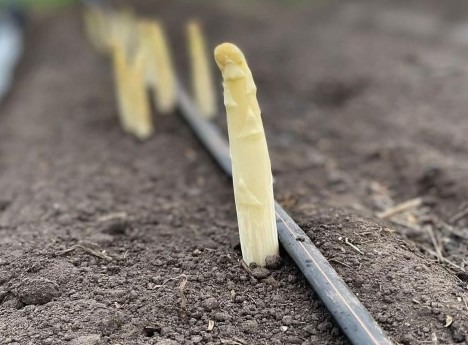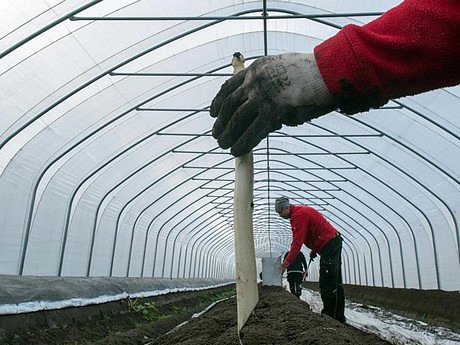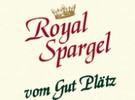About a week later than last year, the first heating asparagus was cut in week 13 at Gut Plätz in the heart of the Altmark. "Demand is still modest; in March, asparagus consumption is usually still limited," says owner Klaus Heinl, adding, "We could have harvested the first spears two weeks earlier, but it was the right decision to let the asparagus grow for another two weeks, considering the cold and the modest demand."
As a bulk supplier, Heinl supplies domestic food retailers and bulk buyers as far away as Switzerland, among others. "We have already been working with selected partners at Engrosmarkt Zurich for years. Since the degree of self-sufficiency in Switzerland is still low, our asparagus meets good demand there." Nevertheless, the fierce competition with Italy is becoming more and more noticeable, he said. "The Italians have planted a lot in recent years and have the competitive advantage of lower labor costs. This unfortunately also leads to the fact that we can not keep up with these cheap prices."
 The first heating asparagus from the Plätz estate is now gradually coming onto the market. Mainly the varieties Backlim and Cyngus are grown.
The first heating asparagus from the Plätz estate is now gradually coming onto the market. Mainly the varieties Backlim and Cyngus are grown.
Nevertheless, this year's harvest has started off quite well, Heinl continues. "In the tunnel systems, we are now harvesting about 250 kg of asparagus per hectare, which I would classify as good. In the open field, we start the new harvest around April 25, so it is still too early for precise information on yield. Generally, the outdoor produce sprouts all at once every year, so we have to harvest it within a very short time. Heated cultivation in the tunnel, on the other hand, is easier to control and therefore more predictable."
According to Heinl, the additional costs (wages, energy, etc.) can hardly be passed on at the moment. "We can produce at break-even, but the profit margins are extremely low." The more difficult conditions of recent years have led the asparagus producer to reduce its cultivation area from 70 to 14 hectares. "Instead of asparagus, we are now focusing more on arable crops, especially corn and potatoes, especially since we need fewer staff for them."
 In Switzerland, asparagus prices have remained about the same, he said. In German food retailing, he said, the price is up to 20 percent below last year's level.
In Switzerland, asparagus prices have remained about the same, he said. In German food retailing, he said, the price is up to 20 percent below last year's level.
The ongoing shortage of staff coupled with the minimum wage increase will continue to hurt care-intensive asparagus cultivation in the future. "The minimum wage increase to 13-14 euros/hour sought on the part of the government will endanger asparagus cultivation and thus the livelihoods of many family farms. The appreciation for high-quality, domestic food is indeed on everyone's lips, but is not reflected in the prices and framework conditions," Heinl concludes.
Further Information:
Klaus Heinl
Royal Spargel Gut Plätz GmbH & Co KG
Plätz 12 
39596 Goldbeck district Plätz
Telefon: 039388-973-0
Telefax: 039388-97329
E-Mail: info@spargelhof-heinl.de
www.spargelhof-heinl.de
